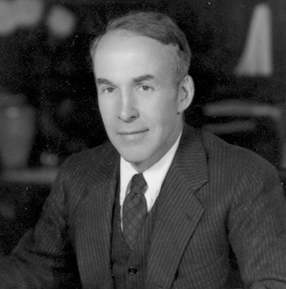The Altar
I built an unnamed altar in my heart,
And sculptured sacred garlands for a frieze
From delicately petalled memories,—
The fragrance of a word, the fragile art
Of ash-gold hair, dim visioned things that start
With radiant wings from mist of reveries,
And vanish at the telling as a breeze
Blurs mirrored stars in dark pools set apart.
But, as I worshiped reverently there
The symbols of the beautiful, there came
A light aslant the shadows of my prayer
That silenced mine uplifted lips with shame.
The garlands coldly carven in that fair
Unmeaning tracery enscrolled—thy name.
This poem is in the public domain. Published in Poem-a-Day on July 14, 2024, by the Academy of American Poets.
“The Altar” appears in Archibald MacLeish’s third poetry collection, Tower of Ivory (Yale University Press, 1917). In his article, “Archibald MacLeish and the Poetics of Public Speech: A Critique of High Modernism,” professor of English John Timberman Newcomb says, “MacLeish found himself in a position to mount effective critiques of high-modernist thinking because he, no less than an Eliot or a Tate, had grown up within its frame of reference. A comfortable childhood in suburban Illinois, a clubbish education at Yale and Harvard […]. The poet who had entitled [sic] his first book of 1917 Tower of Ivory had much aristocratic cultural baggage to carry with him into the 1930s. But, as MacLeish remarked in the early 1980s, ‘once back in the United States and face to face with the Great Depression and the horrors of that time, it became perfectly apparent that you couldn’t keep your self-respect and hide that way.’”

